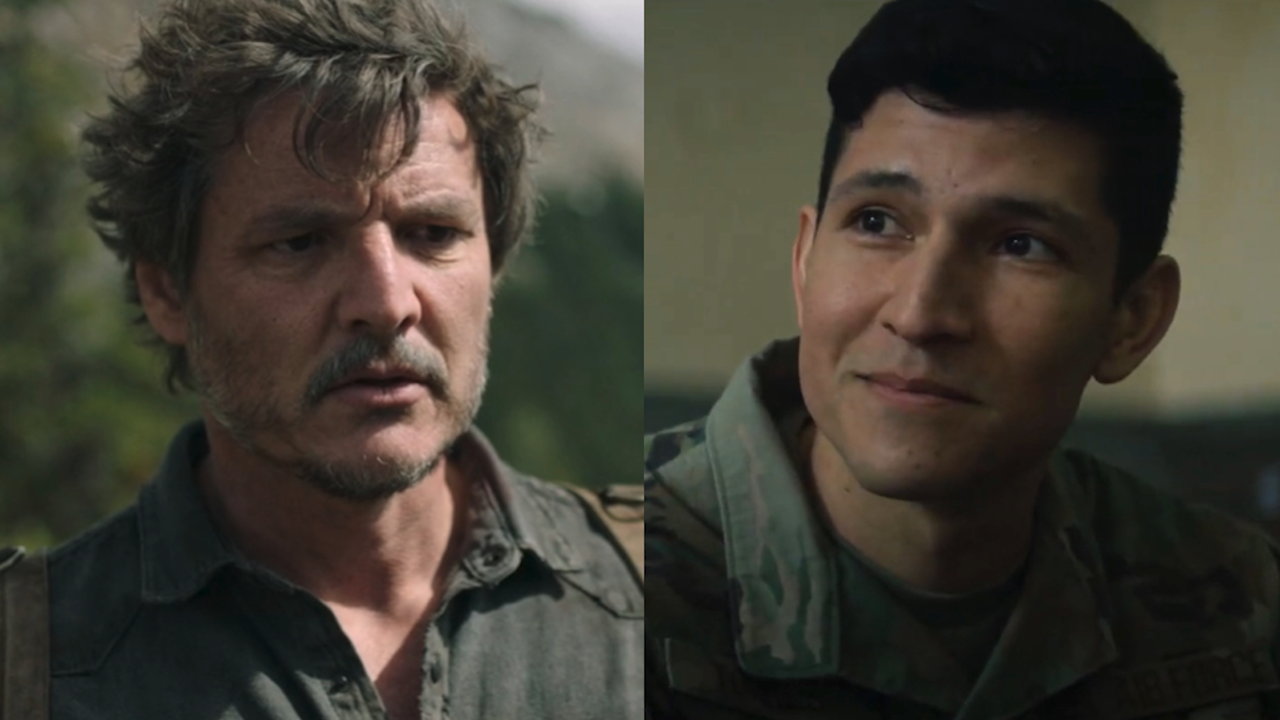10 Reasons Les Miserables Misses The Mark
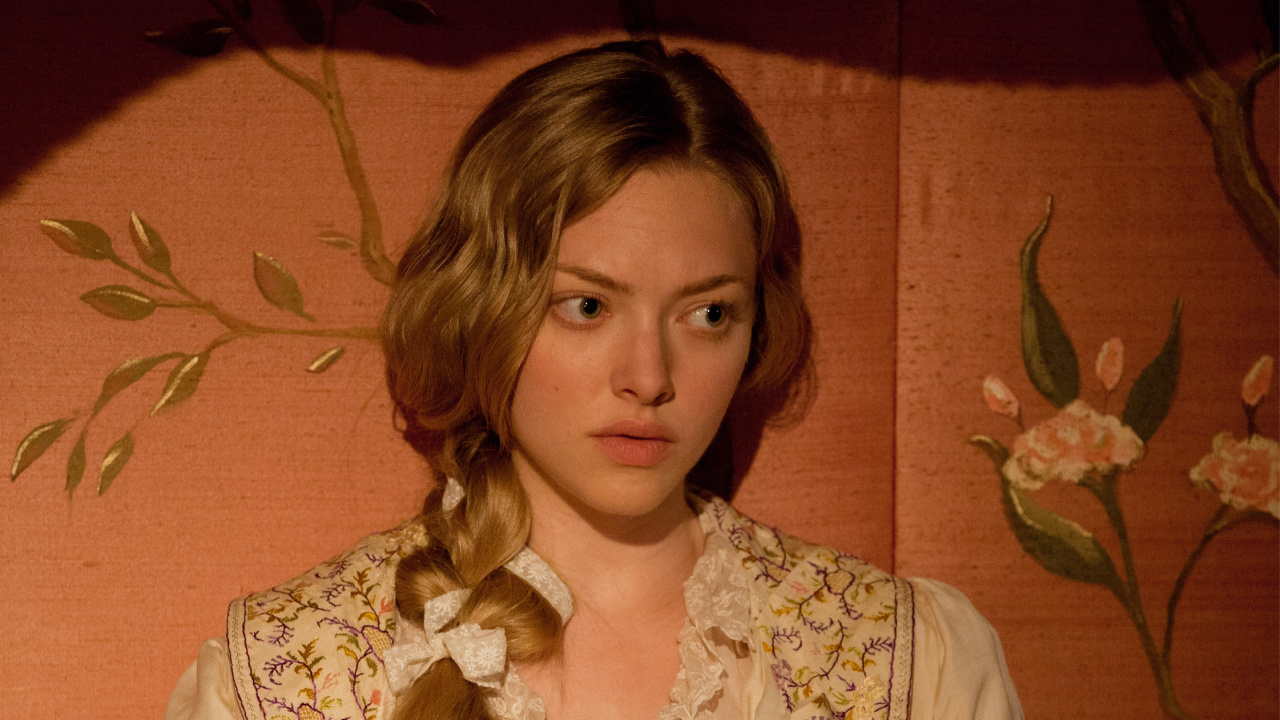
Your Daily Blend of Entertainment News
You are now subscribed
Your newsletter sign-up was successful
Pretty much every year, there’s a movie in the Best Picture discussion that -- because of your personal taste – you single out and question whether it actually belongs. In past years, the vocal majority has expressed opposition to Oscar nominees like Extremely Loud and Incredibly Close, The Blind Side, The Reader and Crash. The last one went on to win the Best Picture trophy.
And so it goes this year with Tom Hooper’s Les Miserables, a film that was deemed Oscar worty long before anyone had seen a single frame, for various reasons. Hooper is coming off of The King’s Speech, which won multiple Oscars including Picture, Director and Actor (for Colin Firth). He’s assembled a glittering ensemble of respected Hollywood stars, and is adapting a beloved Broadway musical.
I don’t care for the film. I’m surprised it remains in the Oscar discussion, even after people whose opinions I respect have seen it (our own Katey Rich, for instance, gave it 4-out-of-5 stars in her review). Slowly but surely, though, I’ve found support in the Cinema Blend offices. So with the musical opening in theaters on Christmas Day, Kristy Puchko joined me for a lively conversation about the 10 reasons we were deeply disappointed in Hooper’s Les Miserables. See the film, then see if you agree with what we have to say:
[Editor’s note: This discussion contains spoilers about Hooper’s film adaptation, though the musical Les Miserables has been around since 1980. Still, tread lightly.]
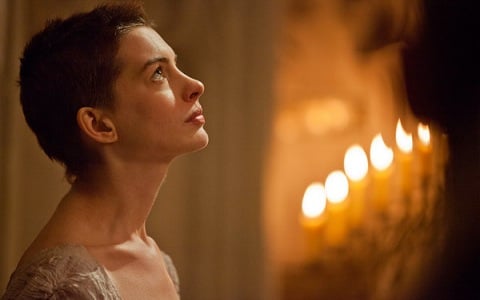
Sean: Kristy, I was so happy to hear in our latest staff meeting that you're baffled by the love being shown to Tom Hooper's Les Miserables. I found it so underwhelming, and am shocked that it continues to find its way into the Oscar conversation. It's ludicrous. This isn't simply an overrated average movie. It's a flat-out bad movie. We've been challenged to come up with 10 reasons why we think Hooper's adaptation of the award-winning stage musical fails. Do you think we can do it? Where should we begin?
Kristy: I think we can do it with ease. But before we rip into why Hooper's Les Mis is such a miss, I want to point out that I am a big admirer of the stage show. I went in knowing all the words to the songs--except for the one they added. Now, I didn't expect this to necessarily top the experience of seeing the stage show. But I was flabbergasted by how much this misses the mark. Like you said, it's not a good movie.
To start our discussion, I think it might be best to address the eyesore that is the cinematography. Because it makes some moments absolutely unwatchable. So, #1: Sloppy cinematography.
Your Daily Blend of Entertainment News
Sean: What I find so puzzling about the cinematography is how chintzy I think it looks in the majority of the scenes. I'm not sure if Hooper wanted to maintain the atmosphere of a stage-set musical – because every once in a while, he does allow the action to unfold, as when Jean Valjean treks through mountain passes. But mostly, it's characters trapped on what look like small sets shot with crappy digital cinematography. It cheapens the eventual revolution sequences, and it makes the movie feel more West End than vintage Hollywood.
Kristy: But worse yet, he opted for so much handheld! And because he had the actors sing live -- as opposed to lip-syncing along to prerecorded tracks -- he was committed more than most musical directors to picking the best performance take, and often this means really poorly shot moments making the final cut. There's actually a point where you can see Hugh Jackman bump into the camera! It totally took me out of it.
Sean: Wait, you are taking my first point! #2 - Hooper's extreme close-up don't let the film breathe.
Kristy: It is a suffocating experience. In some scenes it works, but it's such a crutch in this movie.
Sean: Well, it really works for Anne Hathaway's money scene. So many emotions have to dance across her face as she sings "I Dreamed a Dream." The closeness of the camera means we can't turn away, and for a moment, that directorial choice works well. But he keeps using it, and it loses its impact. Completely.
Kristy: I totally agree. And that can lead to problem #3: The movie plummets after Anne Hathaway's exit.
Sean: Oh God, totally. But as a fan of the musical, is that a problem with the show?
Kristy: No, not at all. Actually, I never much cared for Fantine's numbers in the show. I will hand it to Hooper and Hathway. They made for care Fantine in a way I never had before. I normally skip her solo on my soundtrack. In the show, there's such a strong tension between Valjean and Javert that you're mainly pulled in by that. Here, not so much.
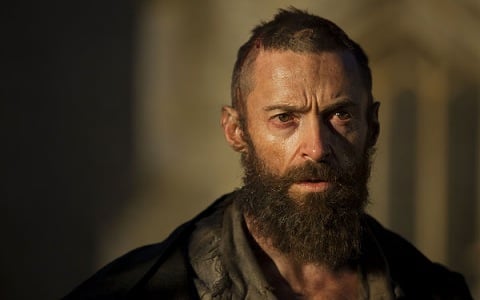
Sean: Ah, and that indirectly brings us to our next point. #4 - Russell Crowe can't sing this material.
I mean, I know Crowe can sing. I've actually heard a number of his songs with the rock outfit Thirty Odd Foot of Grunts. But he sings virtually every note of this material at such a high register. It's a deep miscalculation from his very first verse, and it never gets better. I think Crowe's an amazing actor. I think he can sing. But I think his performance here destroys the Javert-Valjean subplot ... which is crucial to the show.
Kristy: He's very one note. But I felt it was more that neither he nor Jackman can pull off this level of Broadway. They are both very masculine men, but it weirdly felt like they were man enough to pull this feat off. It's a high bar, and they fell short.
Sean: You know who else fell short? #5 - Helena Bonham Carter and Sacha Baron Cohen were grotesquely miscast.
Kristy: It speaks to Hooper totally undercutting the humor that exists in the show. HBC and SBC play the comic relief, but they are cartoons next to everything else going on, especially because Hopper makes everyone else play it so straight. He made "Lovely Ladies" totally sinister, where in the show it's a pretty funny number. Dark, and imbued with tragedy, yes. But it was also funny. Here he makes it all about Fantine, which works for her, but then makes the Thenadiers and their lunacy seem like they come out of nowhere.
Sean: Yes, exactly! Their scenes don't fit in with the otherwise serious tone of the rest of the movie.
I'm unfamiliar with the show, so I didn't expect their scenes. And I understand their importance to the narrative, but Hooper, for whatever reason, edges them toward camp, when nothing else in the rest of the movie suggests that. If that was their choice in how to play the material -- possibly because they just relied on the exact same shtick in Tim Burton's Sweeney Todd -- then Hooper needed to tell them that wasn't the type of movie he was trying to make. Because we go from gut-wrenching scenes of Fantine dying and Valjean wrestling with his conscience, and then we get Thenadier drinking his own piss. I mean ... what?
Kristy: Yeah, in the show the humor is more balanced, and the Thenadiers are a welcomed sense of comic relief, they get cheers when they crash the wedding typically. But this leads to another problem I had.
#6 - Hooper judges his characters in a way the show resists. In the show, the Thenadiers are terrible and scoundrels, but they are also fun and can't be gotten down! And Javert is not a flat-out bad guy, he's a man who is inflexible in his code -- and his code is the law -- and he suffers for it. I won't get into detail for spoilers sake, but I was absolutely livid by Hooper's choice to rob Javert of any possible dignity in his final shot.
Sean: Ooooh, I really want you to be able to elaborate on that, because it's a very important point. Can you get to a little deeper criticism without giving too much away. I mean, the show isn't spoilerable. It has been out for years. People know it.
Kristy: That's true. Okay. Yes, Javert commits suicide because he can't accept that Valjean is a good man. But instead of letting us feel for Javert, his shame and anguish, his fall -- which in the show broke my heart -- is interrupted by his body loudly cracking on a barricade in the water. It just seemed cruel, and frankly in bad taste. It felt like a judgment. A “fuck you” to Javert.
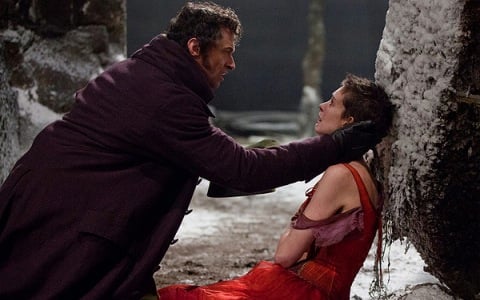
Sean: Another judgment. Which Hooper can't seem to avoid. And yes, I agree. It is in bad taste, because it's an obvious addition on the director's part. My next complaint will need your Les Mis expertise, but it also speaks to Hooper's bad choice as a director.
#7 - The direction for each performance seemed to be "Faster, louder, faster!"
I felt like each performer, perhaps in a struggle to keep up with the music that played behind them as they sang live (and can we hear about that enough?), rushed the emotion. And as I mention, they all seem to sing at a consistently high register. So it amounts to shouting. Not emoting. Not convincing us of the emotion, Shouting. And racing to keep up with the music. Is that a fault of Les Mis, or of Hooper?
Kristy: Yeah, for all the talk about recording live, it didn't seem a huge advantage, aside from Hathaway's solo, which is breathtaking. Much of it still feels canned. Part of that might be because some of the sequences have characters singing together, but in different locations. I doubt there were multiple cameras making sure everyone was live and together.
Sean: Let's get through our last three points. You mentioned that the movie nose-dives after Hathaway exits, but was there something about the second half of the film that you thought really sank its chances at success?
Kristy: Well, Cossette and Marius's romance -- while important thematically -- is so underdeveloped that it just seems silly. I couldn't get invested. They bored me. #8 - The undercooked love story.
Sean: Wait, you didn't believe their "love at first sight" moment?
Kristy: In the show, they bore me too, but frankly that's no excuse. A movie should succeed on it's own merit, and beyond being a barely there plot Eddie Redmayne and Amanda Seyfried have zero sexual chemistry. But even this could have been saved if the film's editing had some sense of musicality to it. Instead, #9 The Editing Abrasively Starts and Stops.
Like, there's one big number -- I think its "One Day More" -- where EVERY character is singing, and then when it hit the finale, it just cuts to the next day and silence. I actually laughed out loud at how awkward and jarring that cut was.
Sean: And it's one of several.
Kristy: It is! It makes it feel like a checklist! “Did that one! Moving on.”
Sean: Hooper doesn't do the majority of his cast any favors. There's no flow. Which is OK, I guess, if you're doing an adaptation that's going to cling to the artifice of a stage production. But I felt from the get-go that Hooper wanted his Les Mis to exist in the outside world ... except when he didn't. And it's awkward.
But not as awkward as #10 - Everyone overacts instead of acts. How do you feel about this? I thought every performance -- even Hathaway's -- was set to the Spinal Tap setting of #11. None of them pulled me in. OK, Hathaway's fit her part. It's a devastating scene, and it required her histrionics. But the rest ... it's all over a piece of stolen bread. Stolen bread! Why is everyone ramping it up into overdrive in every damn scene?!
Kristy: Exactly. There's no downtime or variation. Everyone in this movie has SO MANY FEELINGS and they feel them full force. All the time. And there's little sense of cohesion in which direction you go, so you have the Thenadiers doing full-force camp and the lovers do full-force moony eyes, and it makes for many one-note performances.
I was sad when this movie was over, but not for the reasons I'd hoped to be. I was crushed by disappointment, not by empathy with the narrative's characters.
Sean: You and me both. I can't wait to watch it win Best Picture.
